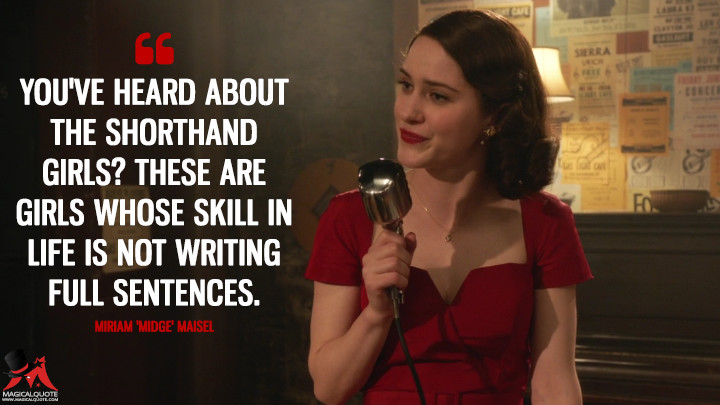It's been a marvelous year for Amazon Prime Video's hit 'The Marvelous Mrs. Maisel.' As we gear up and look forward to the second season and all the revolutionary acts the titular protagonist of the show Miriam "Midge" Maisel has in store for us, we look back at season one and how her heartbreak launched her career to the woman she is today and the woman we all aspire to be.
The series nonchalantly went on to bag eight Emmys and two Golden Globes and the dramedy was hailed an extraordinaire, sealing it as the solution to what Hollywood needs to be in a #MeToo driven era. Of course, the show tackles issues of sexism like pouring cold water over a boiling one. We love it, everyone does, and now as we move on to the second season, we sense everyone raving about the show and the trailer, but there are things still unsaid about season one.
Note, as much I love, love, the show, I cannot move past a peculiar double standard season one had to offer. I was one of those who chimed on to the show pretty late, let's say after the dramedy had created waves globally and every single person I met, urged me to watch the show.
And I did, I thoroughly enjoyed it, and even roared with laughter at Mrs. Maisel's impulsive and haphazard debut at the Gaslight stage, when suddenly my conscience pricked that I was laughing at a woman, making fun of another woman, who "stole" her husband, with her "shorthand skills."
When Midge pours her heart out to her Upper West side Manhattan best friend Imogene Cleary, Imogene immediately warns Midge about these "shorthand girls" who attend secretarial school only to seduce their rich husbands. She further goes on to add that she chose the "longhand" approach and got married, in her words, the "right way."
This leads to the break-out plot for Mrs. Maisel as she takes the stage highly intoxicated and cracks her jokes to the applauding crowd; "You've heard about the shorthand girls? These are girls whose skill in life is not writing full sentences." Mrs. Maisel goes on to develop the joke that she attended a high-end private school to learn writing full sentences only to lose her husband to his shorthand secretary.

I cringed so hard. Because as much as I was told how amazing the show was and how it deserved all the awards it swept off, nobody mentioned the lurking double standard there. Maybe it came from a broken heart, so maybe it's excusable. I waited till I reached the eighth episode to even express my views on this, but Penny Pann's story only turned sour.
She was portrayed as this dumb woman, incomparable to Mrs. Maisel and Joel Maisel's ultimate regret, especially when she walks in to lash out at Midge at the departmental store where she had taken refuge to work as an independent working lady.
1950's New York, the time period the show is based in, revolved around the institution of marriage where women were pressured into marrying young. Midge has two children at the age of 26. "Many women went to college to find a partner that would provide for her," read a '.' There were limited options for women who wanted to work as we can see with Midge's struggle of finding a job once she moves back to live with her parents. The first job she applies for is the job of a doorman.
Shorthand was one of the skills women learned to be decently employed and be as independent as a man working at a corporate office. The job option was not necessarily for the upper middle-class society, to which Midge belongs and Penny does not. However, it was in no way a disgraceful job at the time and was a good option for a poor or a middle-class woman to take up to look after their family.
Even her name is made fun of, "Penny Pann, Penny Pann, Penny Pan," Mrs. Maisel alliterates on stage to make it the punchline. Well, it's not Penny Pann's fault that she is named Penny Pann. Joel Maisel is the man Mrs. Maisel could make fun of the most.
She does to an extent, but with tender savagery bordering on love and pain while with Pann it's just savagery. Added to that, Joel was a married man who had an affair with Pann, whereas Pann was single, and leaped into what she thought was love.
I am not justifying Penny here. She has her share of faults. But the joke-vent-out by Mrs. Maisel targeting another woman for stealing her man with attacks that has nothing to do with who Penny is - except for the fact that she did not go to a high-end school like Midge - seemed a bit off for a show critically acclaimed to be the voice of feminism in this era.
It is also ironic that when Midge is hailed for working in 1950's New York, Penny is poked fun of for being the "shorthand girl."
With season two airing tomorrow, I hope to see the show for what it's truly supposed to be; the dramedy deserving all the awards it won to date.
ncG1vNJzZmillZbEuHrCqKRorJiaeq6t0a%2BcpaelqHquvtJmpJqho5q5bsPOp5ueqpaquW66zpumnbFdqa6tt8innmaZkqTCtXnDqKybpJViwLWtzZ2Yq5yjYr2mus2yZKmZnqN6prnMsmSwoZ6jtq%2BzjKyfqK9dqLKiv86nZGs%3D